


In may 2014 IDFI has published the report on the Access to Public Information in Central Public Institutions of Georgia (The Parliament, The Chancellery of the Government of Georgia, the Administration of the President of Georgia, ministries, offices of state ministers, the Autonomous Republic of Abkhazia, the Administration of South Ossetia, the Autonomous Republic of Adjara and its ministries) covering the period of October 2013 – March 2014. At this stage we present the report on the Access to Public Information in legal entities of public law, state sub-agencies and other public entities (80 public entities in all) for the period of October 2013 – July 2014.
During the period of October 2013 – July 2014 IDFI has referred to 61 LEPLs and state sub-agencies, with 1009 FOI requests
IDFI has received 429 complete responses;
On the diagrams and Access to Information Ratings given bellow, the responses stating that a public institution does not possess information or action has not been conducted are not reflected. Hence the information coves the data given in 688 FOI requests.
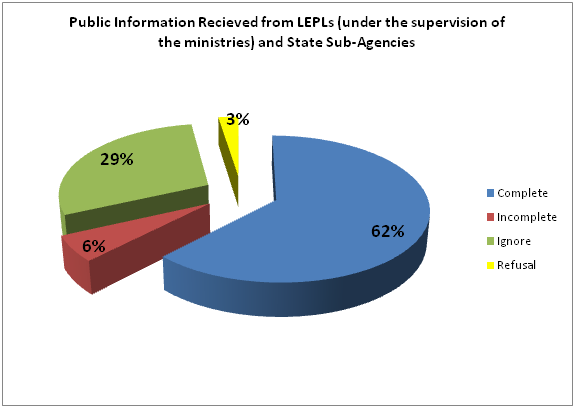
IDFI concludes that within the research period the sub-entities of the Ministry of Regional Development and Infrastructure have had on average the highest Access to Information Rating - 96,25%. The sub-entities of the Ministry of Education and Science and the Ministry of Economic and Sustainable Development fall a bit behind with the rating of 94,53%. According to the research the lowest accountability rating in regards with the access to public information is within the sub-entities of the Ministry of Internal Affairs with the rating of 32,86% and the Ministry of Justice with the rating of 40,2%.
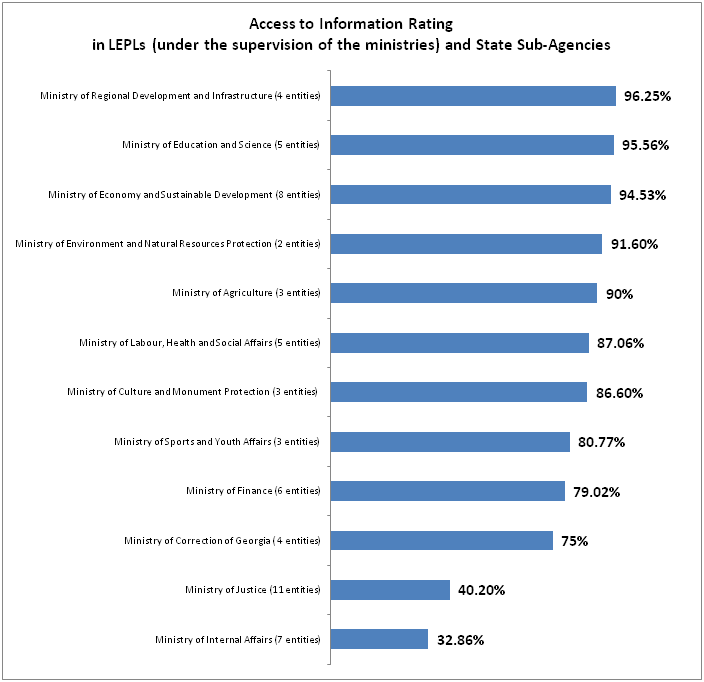
The Impact of the Parliamentary Elections on the Access to Information Rating
According to our report Access to Public Information in Georgia in 2012-2013, published in September 2013, significant positive tendency towards more accountability and transparency was observed within all public entities (including LEPS and State Sub-Agencies) for the period following the Parliamentary Elections of October 1st 2012. One of the main objectives of the given report is to assess to what extent is the above-mentioned positive tendency continued in the sub-entities and agencies of the ministries in the time following the post-election period. When comparing the Access to Information Ratings of the Sub-entities and agencies of the ministries between the post-election period and the period of October 2013-July 2014, it becomes obvious that the number of the complete responses has reduced by 27%, while the number of ignored responses has increased by 26%.
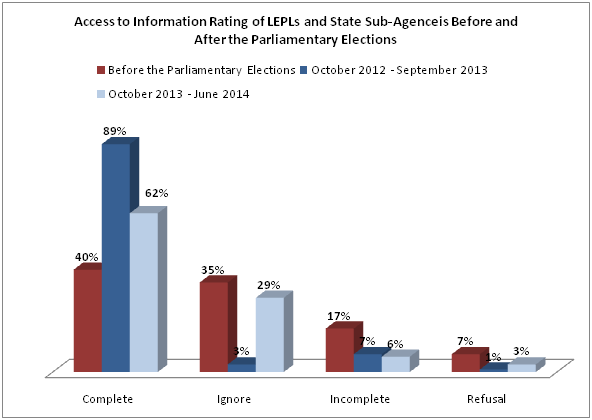
The lower Access to Information Rating in the LEPLs and State Sub-Agnecies is a result of a number of public institutions, which had previously distinguished themselves with high Access to Information Ratings, now ignoring the requests of IDFI. Hence the unaccountability of these institutions have had a significant negative impact on the overall index of the Access to Information in sub-entities and agencies of the ministries.
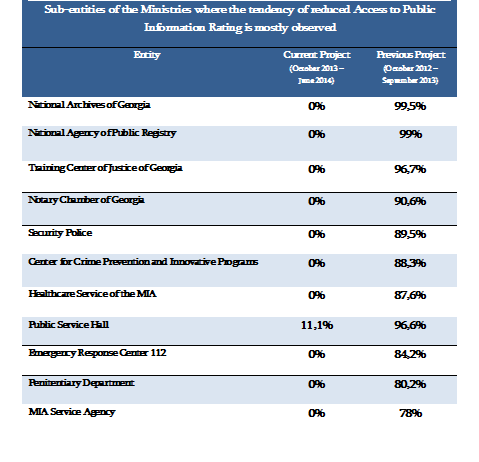
Access to Information Rating of Independent Sub-entities
During the research period, IDFI has also sent FOI requests to independent LEPLs, Regulatory Commissions and other public entities.
During the period of October 2013 – July 2014 345 FOI requests were sent to the 19 such entities;
As it has already been stated above, as a result of not reflecting in the Access to Information Ratings the responses stating that a public institution does not possess information or action has not been conducted, the data bellow will be presented based on the 234 responses received.
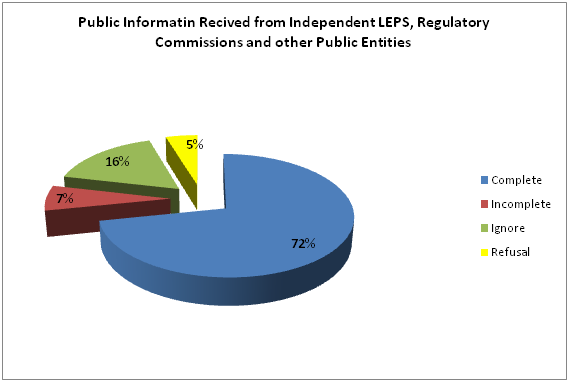
From the above-mentioned 19 entities in the case of 16 the Access to Information Rating fluctuates between 80% - 100%. Between the period of October 2013 – July 2014 the following entities have sent a complete response to IDFI within the 10 days period enshrined in Georgian legislation: Civil Service Bureau, Public Defender of Georgia, Georgian Intelligence Service and the National Parliamentary Library of Georgia. Among these entities the lowest rate of accountability have been shown by the Office of the Prosecutor with 54.6%, Georgian National Energy and Water Supply Regulatory Commission with 8.3%, Georgian Chamber of Commerce and Industry - 0%.
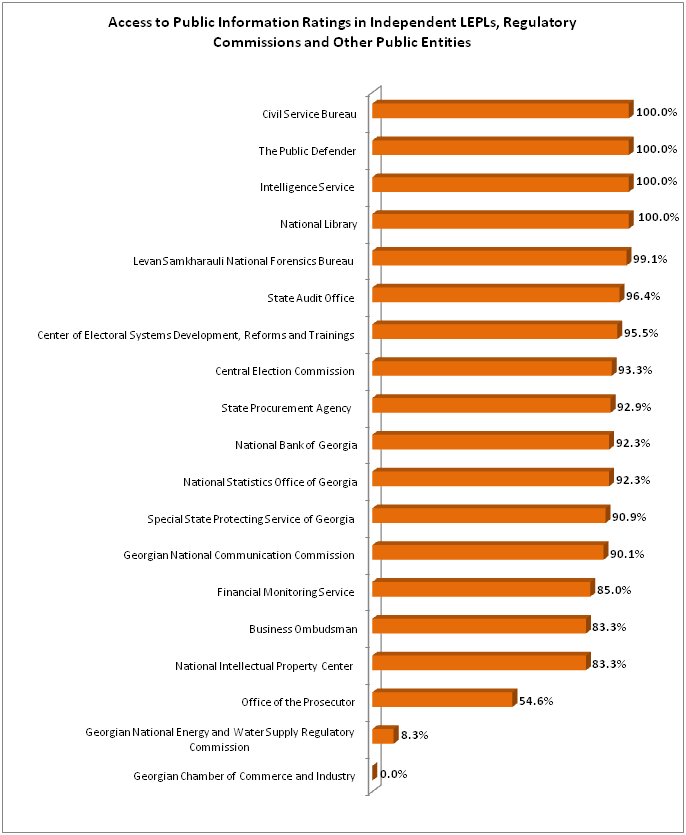
Conclusion
In the period following the political changes of the 2012 Parliamentary Elections in Georgia significant positive steps were observed in regards with the access to public information. IDFI expressed its hope that the tendency of the positive change in regards with the access to information would be observed in the future. Nevertheless the current report has made it clear that in number of public entities the post-election positive tendency was linked with the initial stage of the activities of the new government, when the political will to keep information secret was lower.
When talking about negative tendency in regards with access to public information, the sub-agencies and entities of the Ministry of Internal Affairs and the Ministry of Justice should be mentioned. Most of them ignored our FOI requests during the research period. In addition the Department of Corrections, the Office of the Prosecutor and the Chamber of Commerce and Industry, refused to grant IDFI access to the information which they have publicized in the post-election period, in the beginning of 2013.
The tendency of high standards of access to public information being sustained in number of public entities should be assessed positively. The sub-entities of the Ministry of Economy and Sustainable Development should be particularly emphasized here. While the Access to Public information Rating of the Ministry of Economy and Sustainable Development has decreased by 61%, all the sub-entities have sustained the 100% Rating of Access to Public Information.
IDFI continues to monitor the level of transparency and accountability in the Central Public Institutions as well as in LEPLs and state sub-entities. Hence will further provide public with the Access to Information Ratings of different administrative bodies in Georgia.
/public/upload/goga/rating-lepl-oct-2014.pdf